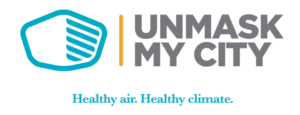 Today we launch a new initiative, Unmask My City, to address the intertwined threats to our health and our climate from air pollution. Through Unmask My City, health professionals and organizations from Istanbul, to London, to Chennai, to São Paulo are raising awareness and sounding the alarm about the many impacts of urban air pollution.
Today we launch a new initiative, Unmask My City, to address the intertwined threats to our health and our climate from air pollution. Through Unmask My City, health professionals and organizations from Istanbul, to London, to Chennai, to São Paulo are raising awareness and sounding the alarm about the many impacts of urban air pollution.
Air pollution (indoor and outdoor) is responsible for one in nine deaths worldwide, and touches everyone — 92% of the human race live in places that do not meet World Health Organisation air quality guidelines. Exposure to small particulate air pollution (PM10and PM2.5) is linked to increased respiratory disease, cardiovascular disease, and adverse birth outcomes. There is also growing evidence for impact on brain development and cognitive function.
Air pollution affects our climate, and vice versa. Many sources of outdoor air pollution emit heat-trapping climate pollutants, such as CO2, black carbon, and methane. Climate change makes air pollution worse when higher temperatures increase ozone formation and smog. Three million individuals die prematurely each year due to outdoor air pollution, and this figure is expected to rise significantly as a result of population growth, economic development, and climate change.
Temporary fixes such as wearing masks and staying indoors are impractical. However, solutions such as alternative transport fuels, switching freight to trains, replacing coal with renewable power sources, providing cleaner fuels for home heating, and better infrastructure and urban planning to support active travel policies will improve people’s health and reduce global warming simultaneously. This will result in significant immediate reductions in illnesses and deaths while also reducing greenhouse gas emissions. A clear win-win.
The Unmask global initiative, coordinated by the GCHA together with the Health and Environment Alliance, Health Care Without Harm, the US Climate and Health Alliance, and the UK Health Alliance for Climate Change, launches today in 10 cities across 5 continents. It aims to promote practical solutions and create tangible local and national policy changes to drive a clear, downward global trend in urban air pollution by 2020. This will allow cities to move forward in meeting WHO air quality guidelines by 2030, and address the urgent need to combat climate change.

As part of this initiative, several Unmask cities have undertaken community-based monitoring to increase local awareness of the dangers of air pollution. In Serbia, for example, only a single official air quality monitor measures PM2.5 for the entire country, despite the fact that 10,000 people died prematurely in 2010 due to air pollution. Unmask partners in Belgrade are conducting community monitoring to call attention to the problem.
To help visualize people’s exposure to air pollution, custom-made light masks that connect to the air quality monitor and a smartphone app display data with LEDs lights using a colour-coded system (green, yellow, orange, and red, linked to WHO air quality guidelines) for air pollution ranges. Data simultaneously posts to a web-based map.

We have the knowledge, technology, and global understanding to address this problem. All that remains is the public and political will to implement the changes – in cities and in countries – to clean up our air. Addressing air pollution and unmasking our cities will have huge immediate and long term benefits for the health of our communities, our economies, and our shared global climate.
Visit the Unmask My City website for details and look for #UnmaskMyCity on Twitter, Facebook, Instagram and LinkedIn.

